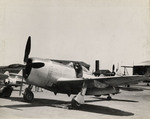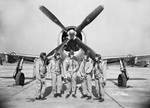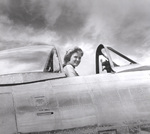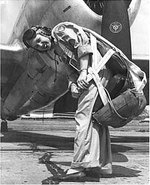P-47 Thunderbolt
| Country | United States |
| Manufacturer | Republic Aviation Company |
| Primary Role | Fighter |
| Maiden Flight | 6 May 1941 |
Contributor: C. Peter Chen
ww2dbaseThe P-47 Thunderbolt fighters were designed by two Georgian immigrants to the United States, Alexander de Seversky and Alexander Kartveli. The first prototype was reviewed by the United States Army Air Corps in Jun 1940, and an order was placed in Sep 1940. The design was nearly all-metal, and contained advanced features such as self-sealing fuel tanks, air conditioned cockpits, and large turbochargers to supplement the Pratt and Whitney engines. Although the resulting fighters were rugged, the features meant they were to be large fighters weighing in at 4,490 kilograms even before armaments were installed. In fact, they were the heaviest single-engine fighter in operation across all countries during the WW2 era. The size and weight also meant they required long runways in order to take off and land, as well as their relative ineffectiveness in their originally intended role of high altitude interceptors. The first time US Army Air Force 365th Fighter Group's Second Lieutenant Paul L. Van Cleef saw his fighter, his first impression was "Wow!!! That's BIG! Does it fly?"
ww2dbaseAfter working out many initial problems, P-47 Thunderbolt fighters were sent to the United Kingdom in late 1942 to join the Eighth Air Force, where their first main missions included bomber escort and ground sweeping operations. P-47 Thunderbolt fighters also served in the Pacific, performing escort missions out of Australia by 1943. By 1944, they were present in all operational theaters involving the United States Army Air Force except the US Territory of Alaska. Later in the war, they gradually took on the role of fighter-bombers in Europe, sweeping German ground targets with their eight machine guns and optional bombs or rockets. By the end of the war, they were among USAAF's most-used fighter-bombers, having destroyed thousands of tanks, locomotives, trucks, and parked aircraft. Maintenance crews liked them for their reliable construction and ease of maintenance in the field. Since they were not effective as interceptors, that role was largely taken over by other models such as the P-51 Mustang fighters. The Soviets also operated 203 P-47 Thunderbolt fighters, though they were relegated to rear areas for defense duties.
ww2dbaseAlthough crash-landing capabilities, if one could describe it that way, would never be a primary feature during development, P-47 Thunderbolt fighters were known for it when it was absolutely necessary. "A lot of people said it landed better on its belly than it did on wheels", said Mac McWhorter of US Army Air Force 365th Fighter Group; "It was an ideal belly-landing plane." First Lieutenant Neal E. Worley of the same unit was forced to do the same as well, and he reported that the heavy radial engine acted as a battering ram of sorts, knocking down trees and bushes in the path of a crashing P-47 Thunderbolt fighter. "There isn't a P-47 pilot alive who wouldn't elect to belly one in rather than bail out", he said.
ww2dbaseDuring the P-47 design's production life, a total of 15,683 examples were built.
ww2dbaseSources:
Robert Dorr, Fighting Hitler's Jets
Robert Dorr and Thomas D. Jones, Hell Hawks!
Wikipedia
Last Major Revision: Jan 2009
P-47 Thunderbolt Timeline
| 6 May 1941 | P-47 Thunderbolt aircraft took its maiden flight. |
| 13 Oct 1941 | A production order was placed for the improved Republic P-47D Thunderbolt fighter. |
| 8 Aug 1942 | The Republic XP-47B prototype aircraft crashed during flight trials. |
| 13 Apr 1943 | The first operational sortie of the new Republic P-47B Thunderbolt aircraft was undertaken by the US 8th Air Force based in the United Kingdom. US 8th Air Force would provide high altitude escorts and would engage in fighter sweeps. |
| 3 Jul 1943 | The prototype aircraft XP-47K was completed. This aircraft incorporated the all-round-vision bubble-type canopy of a Hawker Typhoon, which was soon adopted as standard on all later production models of the P-47D. |
| 30 Jul 1943 | Fitted with new drop-tanks which enable the P-47 aircraft of US VIII Fighter Command to reach the Dutch-German border, eight squadrons of P-47 aircraft were despatched to escort home 186 B-17 bombers returning from a raid on Kassel, Germany. |
| 23 Mar 1944 | Loaded with 204 US Army personnel as passengers, 12 P-47 Thunderbolts, and 50 P-51 Mustangs, escort carrier USS Card departed Staten Island Army Base, New York bound for Casablanca, French Morocco. |
| 4 Aug 1944 | An extensively modified Thunderbolt fighter (XP-47J) became the first airscrew driven aircraft to exceed 500 mph in level flight with a recorded speed of 504 mph. However the P-47J did not go into production as the Republic development team chose to concentrate on the more advanced XP-72 project. |
| 11 Feb 1945 | Loaded with 47 US Army P-47 Thunderbolts and 175 US Army and Navy personnel as passengers, escort carrier USS Card and the similarly loaded USS Bogue departed New York as part of Convoy CU-58 bound for Liverpool, England, United Kingdom. |
SPECIFICATIONS
P-47D
| Machinery | One Pratt & Whitney R-2800-59 twin-row 18-cylinder radial engine rated at 2,535hp |
| Armament | 8x12.7mm Browning M2 machine guns, optional 907kg bombs or 10x127mm rockets |
| Crew | 1 |
| Span | 12.42 m |
| Length | 11.00 m |
| Height | 4.45 m |
| Wing Area | 27.87 m² |
| Weight, Empty | 4,535 kg |
| Weight, Maximum | 7,935 kg |
| Speed, Maximum | 685 km/h |
| Rate of Climb | 15.90 m/s |
| Service Ceiling | 13,100 m |
| Range, Normal | 1,290 km |
P-47C
| Machinery | One Pratt & Whitney R-2800-59 twin-row 18-cylinder radial engine rated at 2,535hp |
| Armament | 8x12.7mm Browning M2 machine guns |
| Crew | 1 |
| Span | 12.42 m |
| Length | 11.00 m |
| Height | 4.45 m |
| Wing Area | 27.87 m² |
| Weight, Empty | 4,535 kg |
| Weight, Maximum | 6,776 kg |
| Speed, Maximum | 692 km/h |
| Rate of Climb | 15.90 m/s |
| Service Ceiling | 13,100 m |
| Range, Normal | 1,290 km |
Photographs
 |  |  |  |
Videos
 |  |  |
Did you enjoy this article or find this article helpful? If so, please consider supporting us on Patreon. Even $1 per month will go a long way! Thank you. Share this article with your friends: Stay updated with WW2DB: |
Visitor Submitted Comments
2 Dec 2010 11:10:29 AM
I just met ret.LTC Neal E. Worley at the SFVA Eye clinic 12/2/10 and he shared numerous WWII stories of piloting the P47. and I saw his name here in this very interesting article. For an 89yr old he is very active practicing golf and living in Ukiah,Ca.
31 Oct 2016 06:20:20 AM
It is worth noting that the 56th fighter group represented nearly all aerial victories scored the Thunderbolt, and nearly half the aerial victories scored by all combined Naval and Army Air Forces in Europe by the U.S. military during the entire duration of American involvement in the war.
The veterans of the 56th fighter group refused to relinquish these aircraft when the Army tried to replace them with new p51d mustangs late in the war.
Also the Republic P47 had the highest probability of all fighter types to return to base undamaged.
23 Jul 2017 03:16:02 PM
My dad was an armorer with the 65th, SSgt Phillip C. Jones, there are several pictures of him, one noteably in the book and back cover of Osprey Combat Aircraft, P47 Thunderbolt Units Of The Twelfth Air Force, he is standing holding the rocket tubes. We are trying to find the name of the aircraft he is working on, in the 57TFG display Windsor Locks, the picture has the following number in right hand corner "58966A.C, also first two letters on side appears to be El--au---?, I would like to find his acft tail number he was assigned too, his acft commander, crew chief. Also I found out he was awarded the Bronze Star and two presidential citations that I'm trying to track down. We found his DD214 and it has the order for the BS ON IT, any help would be appreciated.
Philip A. Jones, TSgt, USAF, Retired
423-391-0183, tothelake@earthlink.net
30 Jan 2018 05:57:05 AM
Dear all, Please, I'm looking informationa about one mission in WW2 on middle Italy on May 23 1944 - 12 P47 whit 3 bombs for each around 7.00 AM bombing on Giuliano di Roma - Any inforamation about the targhet or in general- Whera I can ask it ?? Thanks in advance
27 Feb 2020 11:20:35 PM
Republic P-47D-23-RA 42-27389/28188 and Republic P-47D-22-RE 42-25539/26388 same MSN
13 Apr 2021 10:17:36 PM
Nice picture
All visitor submitted comments are opinions of those making the submissions and do not reflect views of WW2DB.
» Johnson, Robert
Related Book:
» Hell Hawks!
- » 1,150 biographies
- » 337 events
- » 43,917 timeline entries
- » 1,241 ships
- » 350 aircraft models
- » 207 vehicle models
- » 374 weapon models
- » 123 historical documents
- » 260 facilities
- » 470 book reviews
- » 28,542 photos
- » 432 maps
James Forrestal, Secretary of the Navy, 23 Feb 1945
Please consider supporting us on Patreon. Even $1 a month will go a long way. Thank you!
Or, please support us by purchasing some WW2DB merchandise at TeeSpring, Thank you!
15 Sep 2007 03:26:50 AM
The P-47D was supplied to a number of Allied countries during the War. The Soviet Union was allocated 203 under Lend-Lease, 196 of which reached their destination. Eighty-eight were supplied to Brazil, one Brazilian P-47D squadron operating with the 12th Air Force in Italy from November 11, 1944. Twenty-five were supplied to Mexico to equip the Mexican Air Forces 201st Fighter Squadron which was to have served with US forces in the south-west Pacific but had not left Mexico when Japan capitulated. The Royal Air Force received 825 P-47Ds of which 240 were those having the original framed cockpit canopy- (Thunderbolt I) and the remainder with the bubble canopy -(Thunderbolt II).